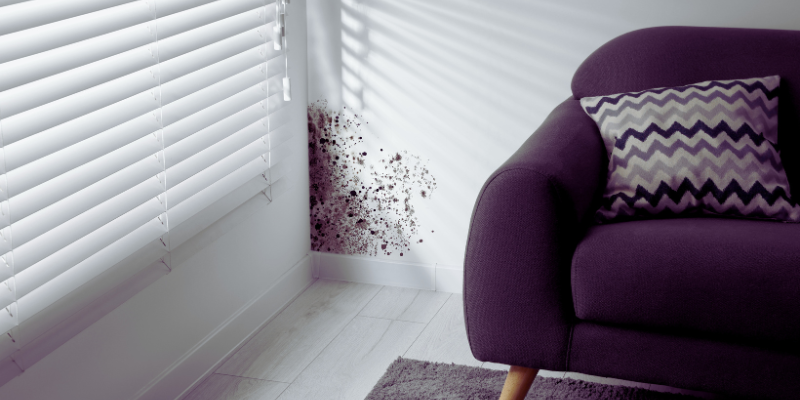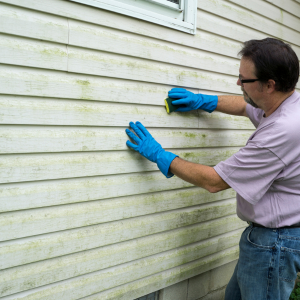
Common Types of Household Molds and Their Health Implications
If you want to sell a house in Chicago that has mold in it, you need to know about the most common kinds of mold in homes and how they can affect your health. Many homes in Chicago are infested with molds like Stachybotrys chartarum, Aspergillus, and Penicillium, which like damp places to grow.
Stachybotrys, commonly known as black mold, is notorious for its potential to cause respiratory issues and allergic reactions. Aspergillus can lead to similar respiratory complications, particularly affecting individuals with weakened immune systems or pre-existing lung conditions.
Penicillium, on the other hand, is often found on things that have been damaged by water and can cause asthma problems and sinus infections. Homeowners who want to sell their home need to know about the health risks that these molds pose. Addressing these issues before they happen not only helps protect future residents, but it also makes the home more marketable by comforting potential buyers about their safety and well-being.
Addressing mold the right way can make a big difference when selling a home, especially in a fast-moving market like Chicago’s. Home Sales Chicagoland is here to help you handle it the right way. Contact us today!
Understanding the Impact of Mold on Property Value
To sell a moldy house in Chicago’s real estate market, you need to know how mold affects the value of the property. People who are interested in buying a house may not want to buy one that has mold on it because it can be harmful to their health and is expensive to fix.
People who are selling things in Chicago need to be extra careful because the heat can make mold grow. Mold not only makes a house look bad, but it also makes people worry about the air quality and the building’s stability.
This can cause home values to drop and keep potential buyers from making competitive offers. Lenders may also be hesitant to give mortgages to homes that have known mold problems, which makes the sale process even more difficult.
Understanding these factors is essential for devising effective strategies to mitigate mold’s impact on property value, enabling sellers to better position their homes in Chicago’s competitive real estate landscape.
How Weather and Climate Affect the Prevalence of Mold in Residential Areas
Mold is more common in residential areas when it rains or snows a lot. This is especially true when trying to sell a house in Chicago that has mold on it. The weather in Chicago is perfect for mold growth because the summers are hot and the winters are cold and wet.
High humidity levels during the summer months can lead to increased moisture inside homes, which is a critical factor for mold proliferation. Furthermore, older homes commonly found in Chicago may have inadequate insulation or ventilation systems, exacerbating moisture retention issues.
There is another source of water that mold needs to grow in the winter: melting snow and ice can seep into basements and crawl spaces. Figuring out how to deal with mold issues and how to sell a house that has mold in such a tough market requires knowledge of these climate-related factors.
Homeowners need to be particularly vigilant about maintaining proper indoor air quality and ensuring that any leaks or water damage are promptly repaired to minimize the risk of mold growth throughout different seasons. .
The Role of Home Inspections in Identifying Mold Issues

In the competitive real estate market of Chicago, home inspections play a crucial role in identifying mold issues when selling a house. A thorough home inspection can uncover hidden mold problems that may otherwise go unnoticed by potential buyers.
Certified home inspectors use special tools and methods to find signs of mold growth and levels of moisture in the air. They then give sellers detailed reports on the state of the property. Taking care of these mold problems before putting the house on the market can help it sell faster and attract buyers who care about their health and are wary of indoor air quality issues.
By proactively managing mold remediation based on inspection findings, sellers can prevent future complications during negotiations or closing processes. Home inspections not only safeguard the transaction but also enhance trust between sellers and buyers by ensuring full disclosure of any existing mold-related challenges.
A thorough check is therefore a smart move for anyone in Chicago’s busy real estate market who wants to sell a mold-damaged home.
Using Technology and Tools to Detect Hidden Moisture Sources Leading to Mold Growth
Leveraging technology and advanced tools is crucial when selling a mold-affected house in Chicago’s competitive real estate market. Employing devices like infrared cameras and moisture meters can effectively identify hidden moisture sources that contribute to mold growth, which often go unnoticed by the naked eye.
Infrared cameras detect temperature variations behind walls, floors, and ceilings, revealing potential water leaks or damp areas that may harbor mold. Moisture meters provide precise measurements of water content in various materials, helping to pinpoint problematic areas that need remediation.
Using these technologies not only helps with thorough property evaluations, but it also builds trust with potential sellers by being open about problems that might come up. Sharing detailed reports made by these tools can also boost buyer trust and make negotiations go more smoothly.
As buyers become increasingly informed about the risks associated with mold, utilizing technology ensures sellers address concerns proactively while positioning their property more attractively in the bustling Chicago real estate scene.
Legal Requirements for Disclosing Mold When Selling a Home
If you want to sell a house in Chicago that has mold in it, you need to know the legal requirements for telling buyers about the mold. Any known mold problems in the property must be fully disclosed by the seller to the buyer.
Illinois law mandates that sellers complete a Residential Real Property Disclosure Report, which includes specific sections where any environmental hazards, including mold, must be disclosed. Failure to disclose mold can result in severe legal repercussions and potential lawsuits from buyers who discover undisclosed mold problems after purchase.
To make sure they are following the rules set by the state, sellers should think about getting a professional mold check and giving the report to potential buyers. Sellers protect themselves and build trust with buyers by following these legal requirements. This makes deals easier in Chicago’s competitive housing market.
Creating an Effective Disclosure Statement About Past or Current Mold Conditions
When selling a mold-affected house in Chicago’s competitive real estate market, crafting an effective disclosure statement about past or current mold conditions is crucial. Transparency and honesty are key to building trust with potential buyers, making it essential to disclose any known mold issues and remediation efforts undertaken.
Include any obvious signs or affected areas in the property. Then, describe where the mold damage is and how bad it is. It’s important to talk about what was done to fix the problem, like professional mold inspection reports and cleanup services done by licensed professionals.
Providing documentation of air quality tests and clearance certificates can further reassure buyers of the property’s safety. It’s also important to mention whether preventive measures have been implemented to avoid future mold growth, such as improved ventilation or waterproofing solutions.
By thoroughly addressing these aspects in your disclosure statement, you enhance credibility and help potential buyers make informed decisions while navigating Chicago’s real estate landscape.
Essential Steps for Selling a Mold-infested House
When selling a mold-affected house in Chicago’s competitive real estate market, it is crucial to adopt effective strategies to ensure a successful transaction. First, obtaining a professional mold inspection is essential to assess the extent of the issue and provide potential buyers with an accurate report.
Getting rid of mold quickly by hiring qualified professionals not only protects people’s health but also makes the property look better. Being honest with potential buyers about mold issues and efforts to fix them in the past builds trust and confidence.
Pricing the house competitively, considering its condition and market trends in Chicago, can attract serious buyers despite the property’s history. Additionally, highlighting other positive attributes of the home, such as location benefits or recent renovations outside of mold treatment, can make it more attractive.
Marketing through quality listings that emphasize these strengths while being upfront about past issues ensures that you reach an informed audience ready to negotiate fairly.
Effective Ways to Remediate Mold Before Listing Your House
When getting ready to sell a house in Chicago’s competitive real estate market that has mold, it’s important to use effective mold remediation methods to get the best price. Start by doing a full check to find all the areas where mold is growing. This will help you with the remediation process and make sure that the whole area is treated.
Hiring a professional mold remediation company is often the best course of action, as they possess the expertise and equipment necessary to safely remove mold and prevent future growth. These experts utilize advanced techniques such as HEPA vacuuming and antimicrobial treatments to eradicate spores from surfaces and improve indoor air quality.
It’s also important to fix the plumbing problems or install dehumidifiers that are causing the mold in the first place, like leaks or poor airflow. If you get rid of mold properly before putting your house on the market, you not only make it look better, but you also raise its value and marketability in Chicago’s real estate market.
Evaluating the Cost-benefit of Professional Mold Remediation Services

When selling a mold-affected house in Chicago’s competitive real estate market, evaluating the cost-benefit of professional mold remediation services is crucial. Mold remediation can significantly enhance the property’s appeal to potential buyers by ensuring a safe and healthy environment.
Professional services not only get rid of mold that can be seen, but they also fix problems that could lead to future outbreaks, which raises the value of the house as a whole. Hiring qualified professionals who use cutting-edge tools and methods can help you avoid expensive court cases that come up when mold problems aren’t reported.
Although some sellers might consider DIY methods to save money, professional remediation offers thorough documentation and guarantees that reassure cautious buyers. In Chicago’s market, where buyers are particularly vigilant about property condition due to humidity-related mold risks, demonstrating a proactive approach can make your listing stand out.
By weighing the upfront costs against potential returns in sale price and speed, sellers can make informed decisions that maximize profit while minimizing hassle during negotiations.
Tips for Preparing Your Home Environmentally Safe Post-mold Remediation
When preparing your home for sale in Chicago’s competitive real estate market, ensuring it is environmentally safe post-mold remediation is crucial. Begin by hiring certified mold remediation experts to thoroughly remove any traces of mold and prevent future growth.
Focus on improving indoor air quality by adding high-efficiency particulate air (HEPA) filters and making sure the house has enough ventilation once the mold has been removed by a professional. To avoid introducing strong chemicals that could bother sensitive potential buyers, use eco-friendly cleaning products.
It’s essential to repair any leaks or water damage that may have contributed to the initial mold problem, as this reassures buyers of a long-term solution. Consider repainting affected areas with non-toxic, mold-resistant paint to provide an extra layer of protection and enhance the home’s aesthetic appeal.
Conduct regular inspections to ensure that all remedial measures remain effective over time, thereby fostering trust with prospective buyers who prioritize health-conscious living environments. By addressing these key aspects, you can create a safe and attractive home environment that stands out in Chicago’s real estate market.
Best Practices for Preventing Future Mold Growth in Homes for Sale
To effectively prevent future mold growth in homes for sale in Chicago’s real estate market, it’s essential to manage moisture levels meticulously. Ensuring proper ventilation is crucial; this includes installing exhaust fans in high-humidity areas such as bathrooms and kitchens, as well as maintaining a functional HVAC system with dehumidifiers to control indoor humidity.
Regular inspections of plumbing systems can help identify leaks early, preventing water accumulation that fosters mold. It’s also important to seal any cracks or openings in walls and foundations to keep out moisture from the outside.
Utilizing mold-resistant building materials, like mold-inhibiting paints and drywall, can further reduce the risk of mold development. Additionally, educating potential buyers about routine maintenance practices—such as promptly addressing spills or leaks and monitoring humidity levels—can reassure them about the long-term health of the property.
By implementing these strategies, sellers not only protect the home but also enhance its appeal in Chicago’s competitive housing market.
How to Price a Home with Mold Damage Competitively
When pricing a mold-affected house in Chicago’s competitive real estate market, it’s crucial to strike a balance between attracting buyers and accounting for the property’s condition. Begin by obtaining a professional assessment to understand the extent of mold damage, as this will influence pricing decisions.
Consult with local real estate professionals who have experience with properties requiring remediation to gauge comparable sales and set a realistic price point. Emphasize the potential costs of mold remediation to justify a lower asking price, but also highlight any completed repairs or improvements that can add value.
Consider offering incentives such as covering closing costs or providing credits for mold removal, which can make your property more appealing despite its flaws. By being transparent about the issue and proactive in addressing it through strategic pricing, you can increase your chances of selling in Chicago’s vibrant housing market.
Marketing Strategies for Selling Homes with Known Mold Problems
When selling a house in Chicago’s real estate market that has known mold issues, employing effective marketing strategies is crucial to attract potential buyers despite the property’s challenges. Highlighting the steps taken for mold remediation and certification from professional inspectors can reassure buyers of their safety.
Emphasizing transparency about the mold situation in all listings builds trust with prospective purchasers. Utilizing high-quality photographs and virtual tours to showcase areas unaffected by mold helps maintain interest while ensuring accurate representation.
Targeting specific buyer demographics, such as investors or contractors familiar with renovation projects, can also be advantageous. Engaging a real estate professional experienced in selling properties with environmental concerns ensures well-crafted marketing messages that underline both the home’s potential and its current condition.
Leveraging online platforms to reach a wider audience and creating compelling narratives about future possibilities for the property further enhances its appeal. These strategies, combined with competitive pricing reflective of existing conditions, position the home more favorably within Chicago’s dynamic market landscape.
Understanding Buyer Psychology: Overcoming Stigma Associated with Moldy Properties
Understanding buyer psychology is crucial when selling a mold-affected house in Chicago’s real estate market, as it involves addressing the stigma often associated with such properties. Buyers typically approach moldy homes with caution due to health concerns and potential repair costs.
To get past this reputation, it’s important to be open about how bad the mold problem is and what has been done to fix it. Professional mold removal services can help build trust and reassure potential buyers that their investment is safe by giving thorough inspection reports and certifications.
Highlighting successful removal of mold and showcasing preventive measures can alleviate fears and emphasize the property’s restored value. Educating buyers on Chicago’s unique climate conditions that contribute to mold growth also helps contextualize the problem, making it less about negligence and more about environmental factors.
Buyers can change their minds about a property from seeing it as a risky purchase to seeing it as a well-kept home ready for new owners if the seller communicates these points clearly.
Negotiating Offers: Buyers’ Concerns About Mold in Real Estate Transactions

When negotiating an offer on a house in Chicago that has mold, it is important to address all of the buyers’ worries about mold. People who are buying homes are often worried about the health risks and high costs of fixing mold problems.
To put buyers’ minds at ease, sellers should show thorough records of any mold tests and cleanup work that has been done. This openness can help buyers believe that the problem has been handled professionally, which can reassure them.
It’s also beneficial to highlight the proactive steps taken to prevent future mold growth, such as improved ventilation systems or moisture control measures. Offering concessions like covering closing costs or adjusting the sale price can further ease buyer hesitation by offsetting anticipated expenses related to ongoing monitoring or maintenance.
Getting a skilled real estate professional who knows how the Chicago real estate market works can help you make these points clear and negotiate terms that work for everyone. This will make the transaction go more smoothly in the end, even if you were worried at first about mold problems.
Financing Challenges: Mortgages and Loans for Properties with Past or Present Mold
Navigating the financing landscape for selling a mold-affected house in Chicago’s real estate market can be particularly challenging due to the stringent requirements imposed by lenders and mortgage providers. Many financial institutions are hesitant to approve mortgages or loans for properties with past or present mold issues, as they pose significant risks to both health and property value.
Buyers often face obstacles in securing financing, which makes it crucial for sellers to address mold problems effectively before listing. Engaging with specialized lenders who understand the nuances of dealing with mold-affected properties can ease this process.
Sellers might need to consider offering incentives or alternative financing options, such as seller-financing or lease-to-own agreements, to attract buyers who may struggle to obtain traditional mortgages. Additionally, obtaining a thorough inspection and remediation certificate from certified professionals can reassure potential buyers and their lenders about the property’s condition.
Understanding these financial challenges is essential for sellers looking to sell your house fast in Illinois, especially in Chicago’s competitive real estate market, and successfully close deals on homes that have previously been affected by mold.
Insurance Considerations When Dealing with Property-mold Claims
When dealing with property-mold claims in Chicago’s real estate market, understanding insurance considerations is crucial for sellers aiming to offload a mold-affected house effectively. Homeowners should first review their insurance policy to determine if mold damage is covered, as many standard policies have limitations or exclusions regarding mold.
Engaging with an experienced insurance agent can provide clarity on coverage specifics and potential riders that might offer additional protection against mold-related issues. Sellers should also gather detailed documentation of the mold issue, including inspection reports and remediation efforts, to support any claims made to the insurer.
It’s important to communicate transparently with insurance adjusters and be prepared for possible disputes over claim assessments. Understanding Illinois-specific regulations concerning environmental hazards can further inform negotiations with insurers.
Being well-prepared in these aspects not only helps in managing financial liabilities but also enhances the property’s appeal by demonstrating proactive handling of mold issues, ultimately facilitating a smoother transaction in Chicago’s competitive real estate market.
Should I Sell My House If It Has Mold?
Selling a mold-affected house in Chicago’s real estate market can be challenging, but with strategic planning, it is certainly possible. If you’re considering whether to sell your house despite mold issues, it’s important to weigh the pros and cons carefully.
Mold can significantly impact property value and deter potential buyers. However, addressing mold problems head-on by investing in professional mold remediation can enhance the property’s appeal and increase its marketability.
Providing transparency about the extent of mold damage and any remediation efforts undertaken can build trust with prospective buyers. In Chicago’s competitive real estate market, pricing your home appropriately is crucial; consider consulting a real estate professional with experience in selling homes with similar issues.
By implementing effective strategies such as targeted marketing, focusing on highlighting other desirable aspects of your property or neighborhood, you can successfully navigate the sale of a mold-affected house while minimizing obstacles in Chicago’s vibrant housing scene.
Does Mold Affect Home Appraisals?
When it comes to selling a mold-affected house in Chicago’s real estate market, understanding how mold impacts home appraisals is crucial. Mold can significantly affect a property’s appraisal value due to its potential health risks and structural concerns.
Appraisers meticulously evaluate the extent of mold damage, as it directly influences the home’s marketability and perceived value. In Chicago, where the real estate market is competitive, a mold issue can deter potential buyers, leading to lower offers or prolonged time on the market.
To mitigate these effects, sellers should consider professional mold remediation before listing their property. Proper documentation of remediation efforts can help reassure appraisers and prospective buyers about the home’s safety and condition.
Additionally, mentioning any precautions taken to stop mold growth in the future can have a good effect on the appraisal. By dealing with mold problems head-on and giving full details during appraisals, buyers can make their homes more competitive in Chicago’s ever-changing real estate market.
Is Mold in a House a Deal Breaker?
When considering whether mold in a house is a deal breaker in Chicago’s real estate market, it’s important to understand both the challenges and opportunities it presents. Mold can indeed be a significant concern for potential buyers due to health risks and structural damage, making effective remediation strategies crucial for sellers.
But it’s not always hard to sell a house that has mold in it. By paying for professional mold testing and removal services, sellers can deal with these problems head-on, giving potential buyers peace of mind that the home is safe.
Additionally, transparency is key; providing comprehensive disclosure about past mold problems and the steps taken to resolve them can build trust with buyers. Highlighting any warranties or guarantees from remediation companies can also alleviate concerns.
Also, setting a reasonable price for the property can bring in investors looking for deals in Chicago’s fast-paced real estate market. Mold may seem like a big problem at first, but if you plan ahead and talk to the people who are interested, it doesn’t have to be a deal-breaker when you’re trying to sell your house.
How Much Does Mold Reduce Home Value?
Mold can lower a home’s value by a lot, especially in areas like Chicago where homes are very competitive. Buyers often lower their expectations of a home’s value when they find mold problems because they are worried about health risks and the cost of fixing the problem.
On average, mold can reduce a home’s value by 10% to 30%, depending on the severity of the infestation and the effectiveness of remediation efforts. In Chicago’s real estate market, where property values fluctuate with neighborhood desirability and market trends, addressing mold proactively is crucial.
To keep the value of their home from dropping too much, sellers might want to pay for professional mold testing and removal services. By dealing with these problems directly, homeowners can keep buyers interested in their homes and keep their property values from dropping.
Sell Your House Fast in Chicago by being transparent about past mold issues and the steps taken to resolve them, this honesty can rebuild buyer trust and ultimately lead to a stronger selling price, even if there were initial setbacks.
